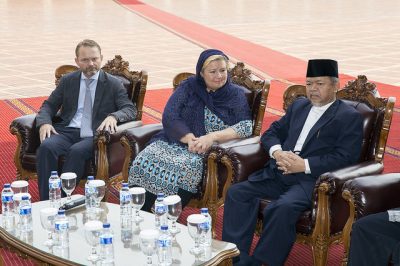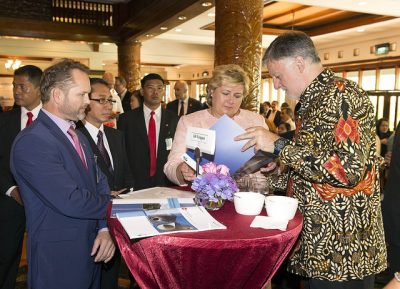Norway’s former ambassador to Indonesia was stripped of his title late last year and recalled to Oslo, after failing to declare a potential conflict of interest tied to funding for an organization run by a woman with whom he was romantically involved. He still works as a diplomat in the foreign ministry, which faces questions over how it handled his case.

Reaction was sharp from various legal experts in Norway when VG reported this week (external link, in Norwegian) on the background and details of what foreign ministry officials initially dismissed as “a personnel matter.” The former Norwegian ambassador’s activity in Jakarta also raises new questions about how Norway manages its billions of kroner set aside for foreign aid aimed at fighting poverty and spurring economic development.
“Here is a red flag that gives reason to pose questions about conflicts of interest,” Tina Søreide, a professor at leading Norwegian business school NHH who specializes in corruption issues, told VG. She wasn’t the only one alarmed by VG‘s story about the errant envoy: “This clearly indicates that there should be a closer investigation into whether the rules were followed, and whether this involves a criminal offense,” said Mats Stenmark, a lawyer who has been working on a doctoral degree about corruption at the University of Oslo.
Stenmark noted that a public entity, in this case Norway’s foreign ministry, could normally launch an internal probe, but that in cases like this, it’s “necessary” to go further. “The affected entity should in addition report this to the police as early as possible, so that they can undertake an independent investigation and determine whether a criminal case should be opened,” Stenmark told VG. Since the funds involved were earmarked for fighting poverty, Stenmark believes the case should be taken especially seriously.
Norway’s highest-ranking representative in Indonesia
It began shortly in April 2012, when the then-46-year-old diplomat Stig Ingemark Traavik was appointed as ambassador and thus Norway’s highest-ranking representative in Indonesia. The appointment came after Norway’s former Labour Party-led government at the time was also keen on funding rainforest preservation in the large, mostly Muslim Southeast Asian nation that has long had diplomatic ties with Norway. Traavik, who earlier had represented Norway in judo competition at the 1992 Summer Olympics before becoming a diplomat, moved to Jakarta with his wife a few months later.
VG reported that Traavik entered into a “secret relationship” in the fall of 2013 with an Indonesian woman who already had received around NOK 1.5 million (USD 179,000) in Norwegian funding for various cultural projects through the embassy in Jakarta. She had applied in April 2013 for more Norwegian funding and her organization received NOK 550,000, through documents VG recovered from the ministry’s archive that were signed by Traavik in May 2013, before their relationship began later that year.

She then applied for more funding, after carrying out what was said to be the successful promotion of a Norwegian author in an area of Indonesia known for its strict interpretation of Islam. VG noted that this application was forwarded to the ministry in Oslo by the Norwegian embassy’s first secretary, not Traavik, in January 2014. VG reported that it sought NOK 1.1 million to fund a similar project, an amount that a case worker in Oslo noted was “considerably higher” than her earlier applications.
The new application was not well-received at a time of budget cuts ushered in by Norway’s new Conservatives-led government. The case worker further noted that foreign aid funds earmarked for fighting poverty could not be used for such a culture project, but the embassy responded with a string of arguments in its favour that contained a note that they had been “cleared with Stig (Traavik).”
The ministry apparently was thus persuaded, and the woman with whom Traavik was having a secret affair was cleared to receive NOK 1.38 million over the next two years. Traavik’s signature was not found on those documents, but he did write a personal letter to the local governor where her cultural event would be held and he wrote a foreword in the project’s program. He also, according to VG, hosted a luncheon to promote the project in the fall of 2014 attended by both the woman, one of her colleagues, the first secretary and a local journalist. He sent the lunch bill to the embassy for reimbursement.
Traavik reportedly ended his relationship with the woman in 2015 but entered into two more with local businesswomen, both of whom were invited to embassy events when Norwegian government ministers were visiting. One of them shook hands with Prime Minister Erna Solberg when she was in Jakarta in April 2015, and Traavik reportedly praised the company where the woman worked. He ended his relationship with the woman in 2015 as well, but then entered into a third that started in early 2016.
First woman’s husband blew the whistle
That’s when his problems began as well, after the husband of the first woman sent an email in May of last year to Traavik’s second-in-command at the embassy, Hilde Solbakken, and copied to four other employees at the embassy. In it, the man who had worked as a diplomat himself revealed what had been going on between Traavik and his wife, and he remarked that he found it highly unfortunate that a person given responsibility as an ambassador “could behave in such a manner.” He stated that his intention was “to inform you,” to make embassy officials aware of how Traavik had conducted himself while he represented Norway in Indonesia.”
The email was forwarded to Oslo, just before Foreign Minister Børge Brende was due in Jakarta himself for a long-planned visit. Neither Brende nor the ministry’s administrative leader Wegger Chr Strømmen would comment to VG on the case, but ministry spokesman Frode O Andersen confirmed the embassy had received an “external alert tied to Ambassador Traavik” on May 25 last year. Andersen said the ministry “followed up the alert in line with internal routines” and with the assistance of a central monitoring agency (Sentral kontrollenhet).
The ministry won’t say when Brende and Strømmen were made aware of the email, nor would it answer questions about the women, who have largely declined comment themselves. Andersen claimed that “relevant” aspects of the case have been examined. Solbakken is now serving as chargé d’affaires at Norway’s embassy in Jakarta, according to its own website.

Andersen confirmed that police have not been called in. “The conclusion was that the ambassador was called home from his position and had to give up his (ambassador’s) title,” Andersen told VG. He called such a recall a “strict” reaction that shows the ministry took the case seriously. VG reported on Monday night that Traavik also received an “oral reprimand,” but he didn’t actually return to Oslo until last December. Just a few days before leaving his ambassador’s post, Traavik was still representing Norway at an annual Norwegian seafood promotion at the posh Shangri-La Hotel in Jakarta, with his third mistress present among the other ambassadors, directors and ministers at the event.
Traavik was not fired by the ministry. VG reported that on February 22, he was given a new job as a senior adviser in the ministry’s division that handles economic and development issues. He retained his security clearance and the same pay he had as ambassador. When Prime Minister Solberg and Foreign Minister Brende traveled to China in April, after diplomatic relations had been restored, Traavik was among the 12 non-political delegates traveling with them.
Camilla Bernt, a law professor at the University of Bergen, shares concerns voiced by other legal experts, especially in light of how Traavik’s mistresses were invited to official events. “It is neither open- nor confidence-building practice if you invite people who have hidden relations with, in settings where they can gain influence and receive advantages that others don’t receive,” Bernt told VG. She stressed that it’s not necessary to reveal all personal relationships, “but either you should make them known to involved decision makers or choose not to make any recommendations on their behalf.”
Targeted by people ‘motivated by revenge’
Traavik himself declined to answer VG‘s questions after VG forwarded its documentation and read its entire lengthy article to him prior to publication. He issued the following statement, however:
“I have made a mistake. I am sorry about that and have taken responsibility for it.” His statement sent on to claim that VG‘s presention of the story was wrong, that no public funds were misused and no one had received unfair advantages. He claimed VG‘s story was based on information from people “motivated by revenge,” and suggested they should have been “protected from themselves.”
The woman involved in Traavik’s first extra-marital affair in Jakarta, who worked with cultural projects that were granted nearly NOK 3 million in funding, denied she had received any personal gain from her relationship to the former ambassador, but otherwise declined comment along with the other two women.
newsinenglish.no/Nina Berglund

